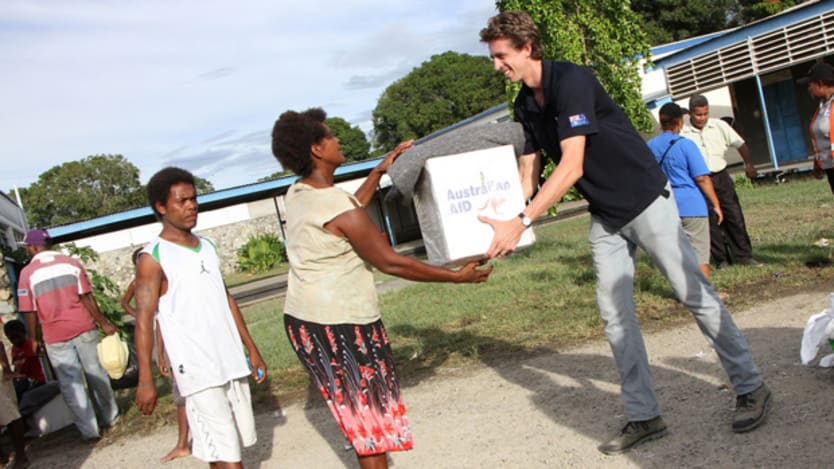
The Australian government has justified its recent budget cuts — quite severe in the case of foreign aid — arguing that it needs to “trim the fat,” but development advocates believe this could end up doing more harm than good in the long-run.
Following the release of the 2014-15 federal budget on Tuesday night, Treasurer Joe Hockey insisted the cuts and the 16,500 government employees to be laid off in the next four years will make the country’s civil service leaner, cheaper and more efficient. According to Hockey, the 16,500 figure (which includes 500 members of DFAT and the now-defunct AusAID) is an expanded number from the “hidden” 14,500 reduction as a “result of decisions taken by the previous government,” despite the fact that Prime Minister Tony Abbott announced last October that almost 12,000 jobs would be cut during his term.
The goal, according to the budget agency, is to transform the government’s “role to be smaller and as efficient and well-targeted as possible” given that the “money it spends comes from taxpayers and that every hard-earned dollar must be respected” and to “reduce waste and duplication within the public sector.”
Local NGOs and international aid groups based in the country, however, just don’t buy the argument, as former AusAID staff now part of the integrated Department of Foreign Affairs and Trade continue to anxiously wait to find out if they will still have a job in a few months, or even weeks.
“[The merger] was a surprise. It is leading to a real loss of capacity to effectively manage Australia’s aid budget,” Paul Ronalds, head of Save the Children Australia, told Devex. “Not only is this likely to make Australia’s aid less effective in achieving poverty reduction goals — the complete opposite to the government’s stated intention — but it’s also likely to run counter to our long-term national interest. We live in an unstable part of the world, with many of our neighbors seeking to lift many of their citizens out of poverty.”
Tim O’Connor, spokesperson for UNICEF Australia, agreed, adding that the AusAID-DFAT integration has been a “rocky process,” with the now confirmed job cuts threatening to reduce “specific skills and experience of Australia’s international development professionals working in government … with the loss of so many staff.”
In February, DFAT confirmed that over 350 former AusAID employees have applied for voluntary redundancy in the middle of the process that is scheduled to conclude by July — giving a clearer, albeit still speculative, picture of who will comprise the 500 that DFAT is planning to lay off.
Priorities
International development stakeholders have also raised their eyebrows about the Abbott government’s priorities, particularly on where to cut and where to boost public spending.
“These aid cuts of around ten percent of the annual aid budget, in contrast to the ten percent in the defense budget, send a worrying message to the region,” O’Connor noted.
Ronalds further explained that there’s no truth about any economic woes that the country is under — an issue allegedly used by the government to justify the cuts — although there remains structural challenges in the country’s finances. He also noted that majority of Australia’s economic indicators remain on the right track, although “growth in government spending is outpacing revenue.”
However, Ronalds reiterated that these are fixable issues.
“There are many other options for savings that would have less impact on the most vulnerable and poorest families and children in Australia or overseas,” he said, adding that perks and benefits for some senior civil servants could be tightened, mainly “fringe benefits related to cars, superannuation and negative gearing,” which “would all save billions.”
This issue of priorities has also sparked strong sentiments from development practitioners and groups in Canada, which also experienced almost the same issues after the Harper government’s decision to integrate its own aid agency to its foreign affairs department and cut the budget and staffing.
In a Linkedin discussion by Devex, a reader commented that “Australian NGOs have no choice but to fight these government cuts” but should accept the idea that they “they will lose the fight until the [incumbent] are voted out of office,” and compared the current situation to what happened in Canada with CIDA just a year ago.
Are you affected by these budget cuts? Do you know any AusAID-DFAT employee in danger of being laid off? What do you think about this staff reduction? Please let us know by leaving a comment below, joining our LinkedIn discussion or — if you wish to remain anonymous — sending an email to news@devex.com.
Read more development aid news online, and subscribe to The Development Newswire to receive top international development headlines from the world’s leading donors, news sources and opinion leaders — emailed to you FREE every business day.
